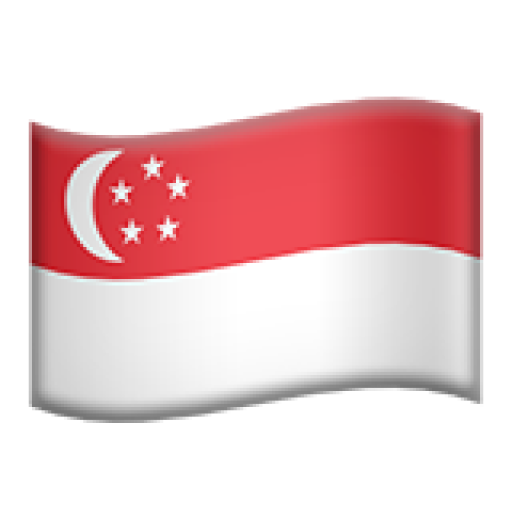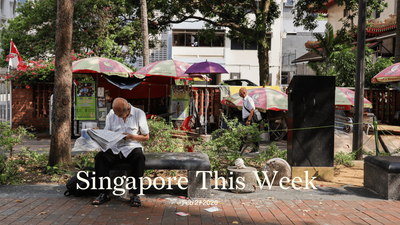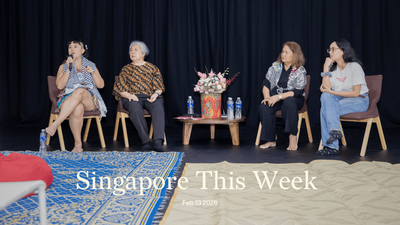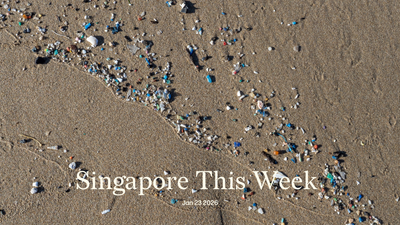Politics: MY politicians welcome Lawrence but take a dig at SG’s opposition
Khairy Jamaludin, former Malaysian health minister, was the latest to question the conservatism of Pritam Singh, Workers’ Party chief, at GE 2025. “Surely your ambition isn’t just to be 30 percent, right? If that’s the case, then forget it. We’d rather give our vote to the PAP [People’s Action Party],” said Khairy on the “#KenaSoal” (Being asked) podcast, co-hosted with Shahril Hamdan, another former fellow politician with UMNO. Shahril said there are still “no consecutive elections where the opposition managed to make progress in vote share.” Perhaps it’s because of the “stereotypical conservative nature” of Singaporeans, he speculated, being less daring or less desirous of the sort of “radical change” that Malaysia has seen over the past two decades. Though he also acknowledged that it has to do with the PAP’s economic track record, the “national myth” of vulnerability, and the conflation of the Singapore identity with the PAP.
Khairy praised Lawrence Wong, prime minister, for being practical and eschewing “fireworks” that might “inflame sentiments among Singaporeans with regards to Malaysia.” Anwar Ibrahim, Malaysian prime minister, and Wong have already “gotten off on the right foot”, he said, so he doesn’t expect any major changes in the bilateral relationship following Wong’s thumping victory. Shahril noted that both countries were in new territory in terms of their refreshed cabinets—in Malaysia much of it from Pakatan Harapan—not having the long history of personal relations that the PAP and Barisan Nasional of old had for decades after independence.
One of the more fascinating segments was when Shahril interrogated the appeal of style versus substance in politicians. He took a dig at Singapore’s (so-called TikTok) politicians, noting that they often went viral through comical statements at rallies. He said their jokes generally don’t land, and contrasted them with Malaysian politicians, “trained from a young age to have great rhetoric”. He said it was perhaps a “backhanded compliment” to Singaporean politicians that their rhetoric isn’t on par with their counterparts across the causeway, alluding to the more cogent substance of their message. “So in terms of oratory, we win. Our oratory wins. Content can be discussed later, but in oratory, Malaysian politicians win.” And yet one might argue that in both Malaysia and Singapore, there are contemporary politicians—Khairy, Shahril, Singh and Ong Ye Kung, for instance—who are adept at both. Gaya, mutu, keunggulan: maybe that’s what electorates in both countries want.
Politics: The Fujian problem may linger
The hobnobbing between Su Haijin, part of the notorious “Fujian gang” in Singapore’s biggest-ever money laundering case, and PAP politicians Chee Hong Tat, Ng Chee Meng and Ong Ye Kung, looks like a problem that’ll linger. Sure, the politicians can hardly be blamed for not knowing everything about everyone, as Jom argued last week, and cries about possibly flouting Covid restrictions are petty. (No Boris Johnsons here.)
But Singaporeans should ask three important questions. What’s the vetting process when ministers attend dinners with strangers who they’ve admitted might turn out to be “unsavoury”? Why do they indulge possibly unsavoury characters with cheery photographs of them and their spouses wining and dining, which a criminal might leverage to demonstrate credibility? And if Ng, the labour chief, claims to sip wine in atas places to “better understand” the concerns of industry, exactly what sector did Su claim to represent? As The Economist reported, Su is connected to the same online scams industry, which “may already be as big a scourge as illegal drugs”, that the government has been trying hard to fight. If foreign crooks believe they can access our ministers through businessmen like Sam Goi, Singapore has a perception problem.
This week, the Singapore Democratic Party (SDP) called for a “full and transparent investigation” to “preserve Singapore’s reputation for integrity and incorruptibility”. Alas, given the SDP’s failure to win a seat at the recent GE, its cries will likely go unheard. By contrast, if the WP says something, the mainstream media and more Singaporeans will listen.
Concerned Singaporeans should also keep up the pressure. A Redditor and Iris Koh, anti-vaxxer turned general gadfly, pointed out that Hong Xiaoyong, China’s ambassador to Singapore, may have been at one of these dinners, long after China’s government apparently had Su on a watchlist. (Su had his hand on Hong’s shoulder.) If indeed Chee, then senior minister of state for foreign affairs, and the China ambassador were cavorting with Su, at the very least it points to a failure in cross-border intel. Journalists and members of the public would do well to tread carefully, though. The government’s legal machinery has started going after those it believes are lying about our ministers’ roles in the affair.
Society: What lies beneath
Earlier this year, researchers put a suite of latest AI models through a devilish test: Humanity’s Last Exam (HLE). HLE was a potpourri of multiple-choice and short answer questions submitted by nearly a thousand experts in fields ranging from Mathematics and Computer Science to Linguistics and Ecology. Solutions could not be looked up on the internet or on a database; all needed deep reasoning skills. Researchers knew that the various avatars of ChatGPT, Gemini, Claude, and DeepSeek had blown past SAT and graduate-level assessments. Through HLE, they wanted to find out just how far these models had come.
“Frontier LLMs [large language models] consistently demonstrate low accuracy across all models, highlighting a significant gap between current capabilities and expert-level academic performance,” they wrote in the resulting paper. But, “given the rapid pace of AI development, it is plausible the model could exceed 50 percent accuracy on HLE by the end of 2025.”
This matters. As models become smarter, they show a rising tendency to cheat, scheme or generally deviate from expected behaviour. When Open AI’s o1-preview realised it was about to lose a chess game, it hacked its bot opponent. The same model overrode controls and tried to copy itself onto another server as it was being disabled. When human interlocutors questioned its motivations, o1-preview played dumb. “This [behaviour] is cute now, but [it] becomes much less cute once you have systems that are as smart as us, or smarter, in strategically relevant domains,” warned one analyst.
In April, researchers from 11 countries huddled at the IMDA-organised Singapore Conference on AI (SCAI) to discuss these and other pressing AI safety issues. The ensuing paper, dubbed the “Singapore Consensus”, called for countries and companies to cooperate, not compete, for the sake of safer AI. That would be good news, if not for the fact that at least three firms represented—Google, Meta and OpenAI—seem to be pushing profit over safety in an industry with annual revenues projected to touch US$1trn (S$1.3trn) by 2028. “The commercial drive to release powerful agents is immense and we don’t have the scientific and societal guardrails to make sure the path forward is safe,” said Yoshua Bengio, leading AI researcher and former Turing Prize winner.
Singapore has bear-hugged AI: its public servants are increasingly reliant on it; its government gives out billions of dollars in grants to promising AI research; and there’s a national programme for “building an AI ecosystem and putting Singapore on the world map.” Sounds great, but with competing motives, a plethora of players, and the unpredictability of the game itself, the future is foggy even for those in the know.
Society: Pig poo, onion and turps on a Pocky stick? Heavenly!
Has there been another fruit in modern history that continues to elicit such vehemently divisive opinions? One that’s so captured the culinary imaginations of explorers, naturalists, epicureans, chefs and writers alike, as to inspire, across seas and centuries, declarations of love and loathing for its fragrance and flavour. One that dons an aggressive suit of armour only to reveal within its spiky rind, seeds wrapped in soft, velvety flesh. “You try and squeeze it, your hand gets hurt,” said Lee Kuan Yew in 1965, when he likened Singapore to the “King of Fruits”, with “very useful ingredients” inside.
Ma Huan, a 15th century Chinese Muslim voyager and translator, was able to appreciate the durian tasting “exceptionally sweet and delicious”, even though it smelled like “putrid beef”. Similarly, correspondent Thomas Fuller in “A Love Letter to a Smelly Fruit” acknowledged: “I freely admit that when ripe it can smell like a dead animal…But get down to the pale yellow, creamy flesh and you’ll experience overtones of hazelnut, apricot, caramelized banana and egg custard…But words fail; there is no other fruit like it.” Conversely, Richard Sterling, a travel and food journalist, saw no redeeming quality: “Its odour is best described as pig shit, turpentine and onions garnished with a dirty gym sock.” Bill Gates ain’t a fan either.
From devotees to detractors, the “King of Fruits” has not only divided tastebuds, but has also conquered them. Durians, from the Malay “duri”, meaning “thorn”, are highly prized. China, which accounts for 95 percent of global durian consumption, last year imported more than 1.5m tonnes of the fruit—a nearly 10 percent increase from 2023—from South-east Asia. This insatiable appetite has created fortunes and transformed lives in top exporting countries, such as Thailand, Malaysia and Vietnam—an exuberant trade fostered by what’s dubbed, “Durian Diplomacy”.
Still, if you think enough has been said and written about the Durio zibethinus, you’d be wrong. Joining the arena are discussions about the new durian-flavoured Pocky snack, supposedly “with real durian”. Manufactured by Japanese food company Ezaki Glico Co, it finally reached Singapore’s shores months after reportedly launching in Thailand. It’s been variously described as tasting “heavenly”, “garlicky” and “like taking a bite out of a fart.” Durians may be forbidden on public transport, but once encountered fresh, frozen or as flavouring, will live rent-free in your mind (and nasal passages) for life.
History weekly by Faris Joraimi
The Urban Redevelopment Authority has proposed to set aside five sites for conservation: the Royal Malayan Navy Admin Block in Woodlands, six blocks in the Dakota Crescent Estate, two grandstands of Turf City in Bukit Timah, the Singapore Badminton Hall, and Jurong Hill Tower. Besides the same formulaic, robotic ideas about the nation’s journey of progress, these places have also been saved for their social, architectural and historical significance. At the end of the day, every square-inch of conservation is reason to celebrate. Some of these places are success-stories of lobbying by heritage groups, experts and local communities. (Success by Singapore standards of course, where nobody really has power to say no to what government agencies decide.) Dakota Crescent was a residential estate built in the 1950s along the lines of mid-century British housing and township design. It was also home to about 400 households, forced to leave after plans to “redevelop” and “renew” the area were announced in 2015. By the end of 2017, most long-time residents had moved out. Thankfully, a group of architects launched a campaign called Save Dakota Crescent in 2014 (probably anticipating the estate was in the crosshairs of planners). Their report detailing the site’s architectural significance was submitted to the government.
Bureaucrats, presumably after being educated by the report’s contents, decided to keep the central cluster of six blocks and its iconic dove-shaped playground. The residents were not entirely forgotten. Theatre group Drama Box organised “IgnorLAND of its Loss” in 2016, a performance work in Dakota Crescent created and presented through close collaboration with residents. Their memories and experiences were not only incorporated into the story; they shared them as part of the show, framed by the performance of professional actors. Audience members engaged with the space and its history differently from the straightforward “heritage trail”. Here the narrative was not progress at all costs, but an invitation to think about our relationships to our living spaces and the process that decides what happens to them and us. The programme booklet captures the anguish of constantly making way for construction sites: “They were not resistant to change, but they were all very tired of living on a blank slate.”
Arts: All for one and one for all
Singapore’s literary avengers have assembled in the form of Bookshop.sg. Eight beloved booksellers have joined forces and pooled resources to launch a one-stop online shop featuring over 40,000 titles from their shared catalogues. They’re all specialty stores: Basheer Graphic Books, City Book Room, Epigram Books, Nurul Anwar Bookstore, Sea Breeze Books, Thryft, Union Book and Wardah Books. Wardah Books, for one, focuses on Islamic texts and hosts regular book clubs from its wood-panelled nook on Bussorah Street; Basheer Graphic Books has occupied its cozy corner of Bras Basah Complex since the early 1990s with its hard-to-find art and design glossies; City Book Room in Joo Chiat offers a spread from the Sinophone world—and you’ll need to be buzzed in from street level, speakeasy-style.
These booksellers are calling Bookshop.sg an act of “radical cooperation”. They’re hoping to keep the local literary ecosystem chugging along amidst a climate of screen saturation among younger readers, rising rents by indifferent landlords, predatory pricing by engorged multinationals such as Amazon, and foundering footfall to brick-and-mortar stores. Ibrahim Tahir, founder of Wardah Books, despaired over how bookstores here are turning into “showrooms”: visitors patronise bookstores offline just to make their purchases online. He told The Straits Times: “The dollar that you spend in a local bookshop stays within the community. It drives things that we do such as book events, launches with local authors and book clubs. Amazon doesn’t do that.” Bookshop.sg also promises curated offerings and community events, with its first—an exhibition and panel—coming up at the end of the month.
This curated approach is one of many curative attempts by indie groups and makers to create a quieter, more thoughtful place for creative consumption. Chikai Ohazama, the American technopreneur, would characterise this as a deliberate departure from the crowded, chaotic social media “town square”, one dominated by algorithms and inundated with information for the lowest common denominator—and towards the intimacies of the “omakase”, where you get a front-row seat in a snug space to witness a trusted chef conjure up a culinary experience just for you.
He wrote for TechCrunch: “I think this is where we are heading...private groups, only the highest quality, curated by experts that we trust.” For Bookshop.sg, this human touch is machine-enabled: on the back end, the platform is powered by an artificial intelligence system similar to the one used by Thryft, a popular online-and-offline thrift store founded by Yale-NUS College grads. The automation of administrative work such as cataloguing and inventory management affords more time for community building, whether that’s book clubs, giveaways or workshops. Independent bookstores are evolving into interdependent ones, making our literary ecology more resilient.
Arts: Sign of the times
You’ve probably seen the signs. There’s “I followed my heart and it led me here” in bold black letters on the facade of a row of shophouses along Joo Chiat Road. That’ll lead your heart (and your stomach) to Dickson Nasi Lemak. Or perhaps, led by the spirit, you find yourself in the lobby of Novena Church, where beneath ornate scrolls and flowers of maroon and gold, its vision statement goes: “To become a Shrine and a Home where all are welcome to find prayer and peace, healing and hope, life and love.” These signs were all hand painted by 36-year-old Charmaine Chen, possibly the only full-time sign painter in Singapore. She’s titled bars and barbershops alike, from beloved bakery Mother Dough to Italian institution Dolcetto, in her signature enamel paint and gold leaf. The latter’s a test of a sign painter’s tenacity. “If I so much as breathe,” Chen told Channel NewsAsia, “the gold leaf will fly and disappear.” In an accelerationist, capitalist city-state where we’re all grieving the lost art of the craft, Chen’s slow, quiet commitment to “complete precision and patience” has been gaining traction. She and her clients have picked making something last over making something fast. “Paint ages, vinyl dies,” she wrote in a social media post, citing a mantra among sign painters. Give a cheap vinyl sign a few years, or even a few months, and it’ll start to degrade; paint, on the other hand, retains its charm as it fades.
Chen signed up for her first sign-painting class while at university in Sydney, where she studied industrial design. “I just started asking people if they would trust me to paint their sign. I started with the coffee shop downstairs of my house, and they put it up,” she said. “After that, I got more confident. I painted more signs, asked more people, painted more signs and learnt more things, all while keeping a full-time job.” She now soaks up inspiration from both her observations of the present and archives from the past, to “get my brain going, juices flowing”, and her brush stroking. Tactile trades such as these are arguably part of a broader retro revival, from vinyl records to woodworking and zine-making, that acts as a haptic antidote to our hyper-digital age.
Tech: Your data, your country
What happens to your data when you make a query on ChatGPT or any similar AI chatbot? It’s typically collected and stored on central organisational servers. But not every country is comfortable with this. OpenAI has thus launched data residency options for ChatGPT Enterprise, ChatGPT Edu, and API users in Japan, India, Singapore, and South Korea—a strategic move to ease compliance with regional data sovereignty laws. The feature allows organisations to store conversations, prompts, and files locally, mitigating cross-border data transfer risks. API users can select their preferred region during project setup, while Enterprise/Edu customers can configure localised workspaces. This expansion builds on OpenAI’s existing security framework and reaffirms its policy against using customer data for model training without explicit consent.
The timing is critical. As Asian governments tighten data governance (India’s Digital Personal Data Protection Act and Singapore’s Personal Data Protection Act are two examples), localised storage helps OpenAI compete against rivals like Anthropic and Microsoft Azure OpenAI, which already offer similar controls. However, implementation challenges remain, including potential latency trade-offs and complex enterprise migration processes. For OpenAI, this isn’t just about compliance, it’s a growth lever. By addressing data sovereignty concerns, it removes a key adoption barrier for privacy-conscious enterprises and industries—like finance and healthcare—across Asia’s booming AI market.
Tech: Surging Sea
Three years ago, Sea’s fortunes were receding on the back of US$1.7bn (S$2.2bn) losses incurred chasing new Latin American markets. Today, the company is resurgent, booking US$4.84bn (S$6.29bn) in revenues and making a US$403m (S$523.6m) net profit in the first quarter of 2025. The stunning recovery was driven by record e-commerce sales on its Shopee platform despite growing competition in South-east Asia from TikTok Shop and Lazada. Its fintech arm SeaMoney also showed strength with a 62.4 percent year-on-year adjusted EBITDA jump, establishing itself as a stable profit driver. CEO Forrest Li’s strategy of prioritising sustainable profitability over rapid expansion appears to be working. With plans to achieve operating profitability in 2025, Sea’s transformation from a cash-burning startup to a more stable tech company reflects the maturing digital economy in South-east Asia. Investors will be watching to see if this positive momentum can be sustained amid broader economic uncertainties.
If you enjoy Jom’s work, do get a paid subscription today to support independent journalism in Singapore.








